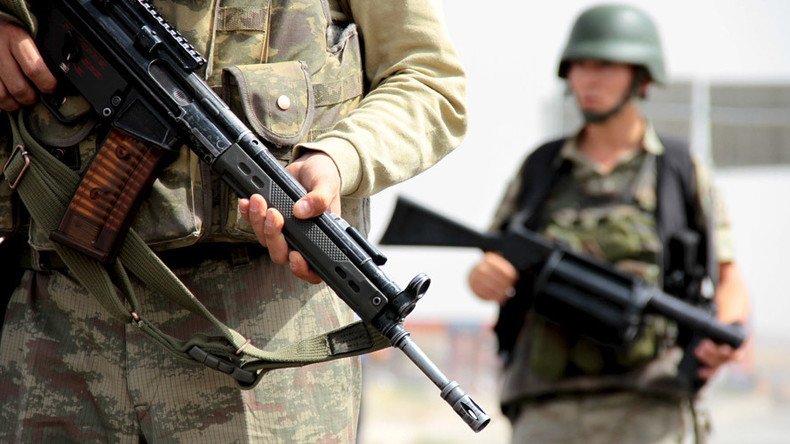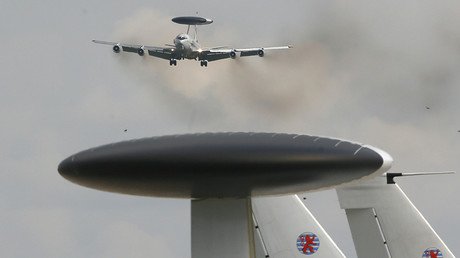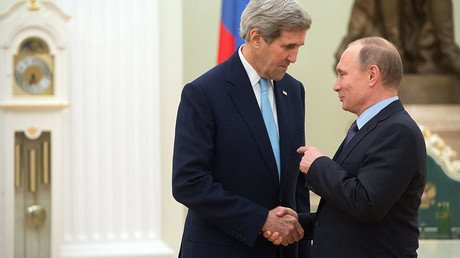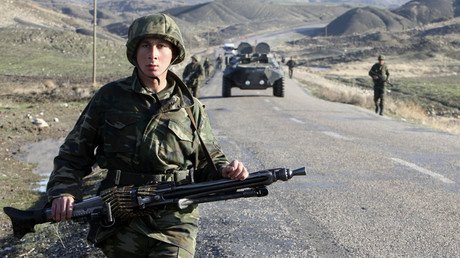Syria: The break for the border

Who is the supreme profiteer of the Russia-Turkey drama? No question: it’s the Empire of Chaos. A desperate Ankara increasingly depends on NATO’s embrace.
In the crucial Pipelineistan arena, the Turkish Stream project has been suspended (but not canceled). Eurasia integration – the key 21st century project for both China and Russia – is severely hampered.
Meanwhile, what passes for the Obama administration’s “strategy” is more slippery than a Japanese eel. US Think Tank land interprets it as an “effort” to “de-conflict the battlefield” even as the main NATO planks acting in Syria (US, UK, France, Germany, plus Turkey) gear up for an alleged “large offensive” against Islamic State (ISIS). “Alleged” because the whole op involves prime shadow play. And “de-conflict” could rather mean “re-conflict.”
It’s no wonder President Putin interpreted Sultan Erdogan’s downing of the Russian Su-24 as supremely illogical. Reasons, of course, include the Russian Air Force’s pounding of the Turkmen – Ankara’s fifth column in northern Syria. And the relentless Russian assault on the stolen Syrian oil racket, which involves collusion between some pretty prominent Turkish figures and ISIS.
It gets even more illogical when we look at the crucial energy sphere. Ankara depends at a rate of 27 percent on oil, and 35 percent on natural gas. Last year, Turkey bought 55 percent of its natural gas from Russia, and 18 percent from Iran.
Because of its manifold infrastructure problems, Iran simply won’t be a strong competitor to Gazprom for supplying natural gas to Turkey – and Europe – anytime soon. Assuming it will be restarted in the future, Turkish Stream would be a very good deal for both Turkey and central and southern Europe.
Spin me a coalition
The current shadow play – which includes the deployment of US Special Forces to northern Syria – opens the possibility that Turks and Americans are about to launch a major offensive to expel Islamic State from the crucial Jarabulus crossroads. Erdogan’s pretext is well known: to block by any means the attempt by YPG Syrian Kurds to unite their three cantons in northern Syria. In this corridor, Erdogan wants to install a dodgy, hazy bunch of Turkmen – his proxies – mixed with unspecified Sunni “moderate rebels,” keeping all lines of communication (and smuggling) with Turkey open.
Syrian Kurds, on the other hand, want to get there first. With American air support. And with Russian air support. This is one of the few things Team Obama and the Kremlin do agree on in Syria – to the absolute despair of the Sultan. The inside word from Ankara is that Turkey would be ready for a ground push on Jarabulus but only under American cover. Quite absurd, considering Washington and Ankara hardly are looking for the same endgame.
Meanwhile, discussing Syria in Moscow, US Secretary of State John Kerry was forced to agree, on the record, with Russian Foreign Minister Sergey Lavrov that “the Syrian people,” via elections, must themselves decide the future of Assad. So even the Obama administration now seems to convey the impression “Assad must go” may be six feet under.
Not so fast. Shadow play firmly remains part of the equation. After all, the famous Top Ten Terrorist List now being haggled upon by all players must be approved by… Turkey and Saudi Arabia, who continue to weaponize all manner of desert snakes, as long as they hiss “Assad must go.”
Into this snake pit crawls the joke of the holiday season; the 34-nation, Riyadh-led anti-terrorism coalition “from all over the Islamic world.” The perpetrator of the war on Yemen, Deputy Crown Prince and Defense Minister Mohammed bin Salman, even pledged this hazy new racket to “stop the flow of funds” to terrorists. As if the House of Saud would decapitate their own, indigenous wacko imams and pious, wealthy “financiers.”
This “coalition” inbuilt in the already existing, US-led, monstrously ineffectual Coalition of the Dodgy Opportunists (CDO) is undiluted spin. Saudi Arabia and the United Arab Emirates (UAE) have done absolutely nothing against ISIS since summer. They’d rather merrily bomb Yemen. Their “armies” are mercenary-infested. No mercenaries, no Saudi army. Pakistan and Egypt do have armies, but they are consumed by dire local problems and would not relocate troops to the “Syraq” quagmire even if bribed by a mountain of petrodollars.
With this spin, concocted by their savvy Edelman lobbyists, Riyadh believes it can change the subject from how it’s trying hard to break up Syria.
A breakdown of Syria’s population, including the masses of refugees, would yield something like 14 percent Alawite Shi’ites, 5 percent Christians, 3 percent Druze, 1 percent twelver Shi’ites, 10 percent Kurds – the absolute majority leftist - and around 40 percent Sunnis, mostly secular and many of them leftists, not to mention comfortably linked to the Damascus and Aleppo business elite, that is, accommodated with the government for generations.
Riyadh’s – and Ankara’s - belief that a small bunch of Salafi-jihadist, from whatever persuasion, would be able to disrupt such a complex balance, not to mention rule a whole nation, does defy any logical explanation.
The break for the border
So everything now hinges on the break for the border. Syrian Kurds have been loudly announcing something along the lines that “Real Kurds go to Jarabulus.” Jarabulus is, in a nutshell, Turkey’s last stand in Syria (the Russian Air Force has all but exterminated the Turkmen fight column in northern Latakia).
Imagine a Kurdish unification corridor – running from Afrin to the rest of Rojava. This means Turkey cut off from Syria; crucially, the end of the Jihadi Highway; the end of Turkish secret services offering lavish logistical support for Daesh, from Big Macs to holidays in Turkey; the end of the Syrian stolen oil Daesh Highway. Not to mention the YPG – allied with the PKK – controlling a semi-autonomous province with the status of a proto-state.
Make no mistake: the Sultan will go no holds barred to prevent it. ISIS was never an “existential threat” to Ankara. On the contrary; it was always a very useful indirect “ally.” Ankara will continue to plug the myth that the road to Daesh’s defeat goes through Assad regime change.
Russia exposed the bluff. Yet the lame duck Obama administration is still uncertain; should we use Erdogan even as he recklessly tries to pit NATO directly against Russia? Or should we dump him? The answer lies in who, and how, wins the break for the border.
The statements, views and opinions expressed in this column are solely those of the author and do not necessarily represent those of RT.

















